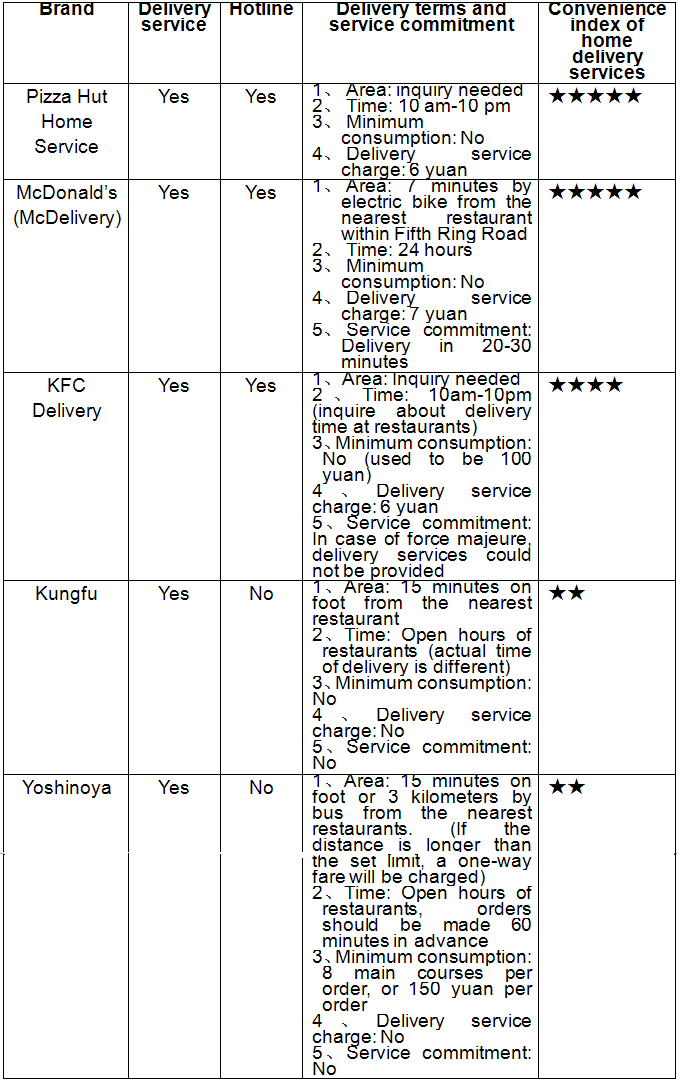(Written by Zhang Yiwen)
Distracted by so many fast-food brands, urbanites sometimes feel puzzled. What should I eat and what are my best options? They seem to have so many choices, but they are often caught in such a dilemma, torn between what they want to eat and what they eventually get. This reflects the relationship between fast-food brands and consumers. It also helps predict the fate of many fast-food brands: grow quickly or face imminent disappearance in the market.
Store-Based Operation: Innovation is Key
Fast-food brands, such as McDonald’s, KFC, Pizza Hut, Yonghe King, Malan Noodles, Kungfu and Yoshinoya, are doing well with many stores and franchised stores, located in virtually every commercial and leisure area in Beijing. These fast-food brands have become the natural choice for office workers, shoppers and urbanites. The store’s convenience and close location helped them become food brands of choice. But many customers naturally feel fed up by the same food, the same brand and the same store every day. They expect new brands and new stores to open in their area, or new varieties of food. If none are available, they are forced to return to their old restaurants again and again. In the fiercely competitive food market, any fast-food brand could be chosen or ignored by diners, depending on food and service quality. For fast-food brands, innovation is key to business expansion, particularly innovation in operations and food variety.
Model brand: KFC
In the past, KFC made great efforts to promote innovation. From safe oil fried dough to French-style pancakes and shrimp hamburgers, it continued to offer new varieties of food. This not only helped increase business revenue, but also improved its brand. Consumers were also interested in trying new food and chose to go to KFC to try and experience its new products.
Model brand: Kungfu
Compared with Western fast-food brands, Kungfu devotes itself to Chinese style fast food. It has built a good reputation among consumers in terms of taste and nutrition. Innovation is not difficult for Kungfu thanks to support from a rich Chinese catering culture.
Customer Services: Delivering a Business
For fast-food brands, delivery services may become big business, in addition to their store-based services. To develop this sector they began to pay attention to delivery services in the past two years. Pizza Hut was the first to offer home delivery service and has made its delivery service a brand. Other fast-food giants, which focused on store-based services, also followed suit to offer such services beginning in 2009, including McDonald’s and KFC. This kind of service helped shorten the distance between the brand and consumers.
(Convenience index of home delivery services offered by fast-food brands in Beijing)

Model brand: McDonald’s
From my personal experience, before McDonald’s set up its 4008 hotline for delivery services, I had to call a nearby restaurant to find out whether it offered delivery. A clerk at the restaurant said no politely because it did not have enough staff to deliver at that time. When I said to the clerk on the phone, “I love McDonald’s”, the clerk laughed and agreed to deliver my order, but I would have to wait a little bit longer. This is McDonald’s, which listens to the consumer and cares about the needs of consumers. This showed, to some extent, why McDonald’s has established itself as an international brand. For other fast-food brands, if they are unable to provide home delivery services due to scale or cost considerations, they should, at least, try to maintain a good relationship with consumers. Restaurants should never damage the image of their brand among the consumer.
Brand Promotion: Publicity Really Matters
Do fast-food brands still need publicity? The answer is YES. Brand advertising, sales promotion, celebrity brand ambassadors or other forms of promotion serve to attract the consumer and grow their preference over other brands. The McDonald’s hotline — 4008-517-517 — is pronounced in Chinese like “I want to eat, I want to eat.” When TV commercials promote Pizza Hut or KFC new products, viewers have a strong desire to try them. Although it is understood that some fast food is junk, they still appear in our minds naturally when we are hungry. This is thanks to the effects of brand promotion.
I want to say to fast-food chains, food is the most important thing in daily life, so pay attention to what people want to eat and be considerate to all your consumers. If you do this you will surely establish a brand identity.
Originally published in 21st Century Advertising, a monthly periodical, in 2009.Slightly modified.
| ||||







